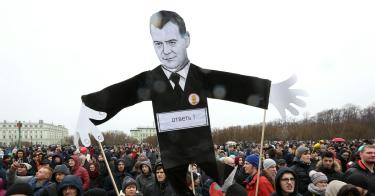On Sunday, Russian police forces arrested opposition leader Aleksei Navalny yet again. Mr. Navalny’s crime? He had organized a nationwide protest, urging a boycott of the March 18 Russian presidential election.
His call to protest was widely successful. His supporters held rallies in about 100 cities across the country. Mr. Navalny has already been released, but awaits a court trial in the near future.
A 41-year-old lawyer, Mr. Navalny is a strong force of “anti-Putinism.” For approximately the past 10 years, he has worked tirelessly to eradicate corruption from the Kremlin, seeking to become Russia’s next president in the process. To remove corruption, for instance, he drafted a bill that bans officials from purchasing cars worth more than 1.5 million rubles and initiated a project called “RosPil” that has disclosed hundreds of financial violations committed by state-run agencies and organizations.
How is the Kremlin corrupt? In particular, Russian heads of government essentially steal cash from citizens for their own personal use. To illustrate, President Vladimir Putin essentially owns a palace, validating his net worth of roughly $200 billion. Mr. Navalny himself has confirmed this illegal debauchery, based on past access to internal financial documents.
How widespread is the corruption? On Monday, the U.S. Treasury Department released a list of over 200 Russian oligarchs associated with Mr. Putin. Each of the oligarchs is now eligible for sanctions — and each is reportedly worth more than $1 billion. The point is that the corruption of these officials, dismally, has caused poverty, inequality and a lack of opportunities for the Russian population.
Naturally, Mr. Putin feels threatened by Mr. Navalny and barred him last month from running in the election. This comes as no surprise since Mr. Navalny has been gaining popularity by the day.
Because the Kremlin controls Russian television and resents Mr. Navalny, it strictly prohibits him from advancing his campaign through TV commercials. To dodge this, Mr. Navalny actually has created a YouTube channel, which has a following of almost 1.7 million subscribers. He also has vastly utilized the traditional and perhaps more effective technique, by holding dozens of outdoor rallies all over Russia the past few years to engage directly with average Russians.
For the most part, the approach has worked well for Mr. Navalny. He has been successful in acquiring supporters and national recognition. For example, one of his latest rallies gathered thousands of supporters across Russia. At these types of events, he gives speeches on matters such as Mr. Putin’s financial thievery and the general corruption of the Russian government.
It is important to note that Mr. Navalny has been holding many of these rallies without official permits, leading to several arrests of him by the police, such as the one this past weekend. Anyway, the Kremlin would probably never grant him rallying permits since he is such a strong advocate against Mr. Putin and his cronies.
Mr. Navalny’s impact on Russian citizens is larger than one might realize, in spite of everything that has afflicted him. He has created a social movement for all citizens of the Russian Federation, symbolizing that they, too, can have a voice and that there is hope for political change in Russia’s future someday. His outspokenness about the truth has sparked a light within Russia — tens of thousands of people in the past year have also been arrested for protesting against the Kremlin’s criminal acts.
Mr. Navalny believes that an election without him is not an election. Without him, the election is not a democratic process — it is merely a continuation of Mr. Putin’s control. In continuing to boycott, Mr. Navalny hopes to achieve low voter turnout for Putin, since the opposite is needed to secure a win, and raise awareness that Russia needs competitive and fair elections now, not in six years when the next election occurs.
Even if Aleksei Navalny does not make it out alive, which is a likely conclusion, his legacy is effecting essential change, beginning in the hearts and minds of the Russian people. If change does come to Russia someday, then Mr. Navalny will go down in history as the one who made it happen.
This piece originally appeared in The Washington Times



